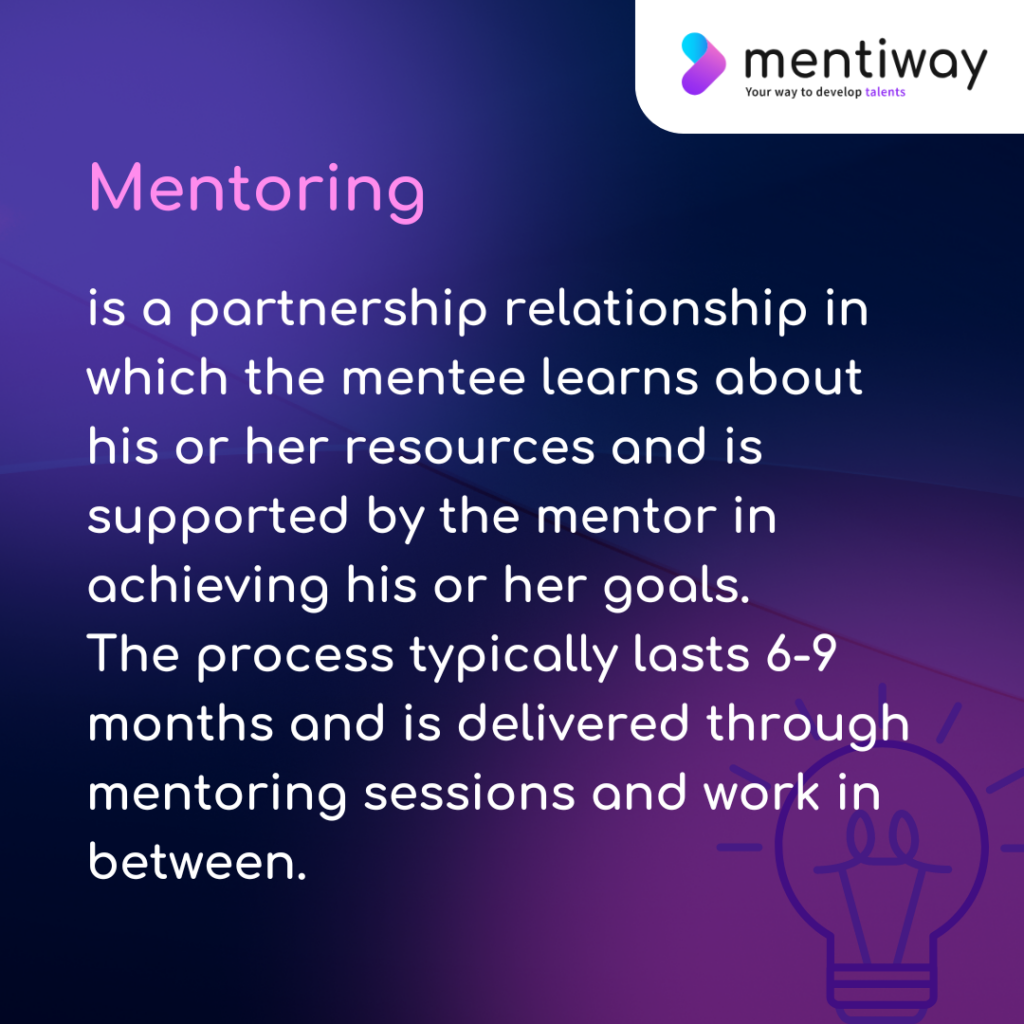Will AI replace Mentors? Artificial intelligence vs. mentoring.
The wave of popularity of solutions based on artificial intelligence is already reaching HR solutions. The use of AI-based tools in development processes and broader human resource management is becoming more widely discussed.
We at Mentiway, representing a technology company after all, are closely watching these trends and are actively considering the use of AI in mentoring processes including the potential replacement of Mentors with AI-based solutions.
But is this actually the right way to go? Can mentoring processes be led by AI in the near future?
In this article I will try to answer this question.
AI capabilities in conducting mentoring and coaching meetings
That the capabilities of AI are growing week by week probably doesn’t need to be proven to anyone. Language models – a branch of artificial intelligence that has been booming for several years now – are becoming more and more advanced. More and more specialized models are being created, dedicated to data analysis, programming, or specific languages (such as the Bielik model for Polish). But even general models – such as Chat GPT are becoming more and more sophisticated, understanding context and able to provide even better answers.
So it’s pretty much a given that we on the Mentiway team are also monitoring the industry to look for opportunities to use AI in conducting mentoring processes. Such solutions have even already found their place in the Mentiway platform (more on that later in the article). But we recently came up with an even more perverse question – is Chat GPT able to conduct a mentoring session?
It turns out that it does. And surprisingly well.
Here is a recording of such a short process based on deepening questions.
AI recognizes the user-Mentee’s answers, asks follow-up questions, and at the end is able to meaningfully summarize the entire session and even give homework.
Surely, with the right arrangement of prompts, it would be possible to expand one session to the entire process, or even for GPT to use more advanced coaching and mentoring techniques.
But will it actually be a mentoring process? Can such a solution replace mentoring? .
Well, that’s right… Let’s start at the beginning, which is what mentoring is in general.
What is mentoring in its fundamentals?

According to the definition of mentoring, available in this article, mentoring is “a cognitive relationship involving the sharing of skills, knowledge and expertise between mentor and mentee through developmental conversations, experience sharing and role modeling. This relationship can encompass many different contexts and is an inclusive two-way partnership for mutual learning, valuing differences.”
And this is where the first crush already appears. Mentoring is first and foremost a relationship.
It is a relationship between two people – a Mentor/Mentee and a Mentee. A relationship in which a process is carried out, which has a partnership character, based on accompaniment and joint development.
Is it possible to build a relationship with artificial intelligence? Maybe I’m old-fashioned, but at this point I think not 😉 .
Benefits of Mentoring for Mentees
Establishing this new relationship is also one of the key benefits noted by Mentees participating in mentoring processes.
Among users of the Mentiway platform, as many as 63% pay attention precisely to establishing new relationships and friendships.
This, by the way, is not the only benefit of mentoring that mentoring with artificial intelligence will not provide. Others of this type include:
- Being able to share your problems with another person (53%)
- Getting feedback and constructive criticism (47%)
- Increased motivation and commitment to work (37%)
- Increase in self-confidence (37%)
- Developing effective communication skills (37%)
Mentors perspective
While on the subject of benefits, it is worth looking at mentoring from the perspective of Mentors as well.
Mentoring as a relationship and process has tangible benefits for them as well. These are often very similar benefits: learning a different perspective, making new friends, developing effective communication skills, self-awareness and insight, and strengthening the sense of being recognized and valued.
If we limited mentoring to only “cooperation” between Mentee and artificial intelligence, this would naturally miss the Mentors side, who also gain a lot from the relationship.
Motivation, emotions, connecting the dots
Finally, I would like to highlight a few areas where AI-led mentoring, in my opinion, has significant shortcomings compared to human Mentors.
First, the process of building and maintaining a relationship evokes natural emotions, which are lacking in a “relationship” with a machine. Sometimes they are positive positive, sometimes negative, but always some. These emotions affect the effectiveness of knowledge acquisition. They increase engagement both during and between mentoring sessions.
Secondly, these emotions, but also the presence on the other side of the person, the desire to meet expectations, sometimes to impress causes more motivation to implement the process. And this is both on the part of Mentees and Mentors.
And finally – mentoring with a human being is unpredictable. The process is different every time. Each successive session is also different. By o is more interesting, more engaging. Each Mentor, each Mentor has a different experience, “connects the dots” differently, so that each process is individual and unique.
Technology and AI in mentoring
So will AI replace Mentors?
In my opinion, for now, no. And certainly not, with mentoring as we understand it.
But of course, this does not mean that mentoring cannot be aided by technology and AI.
We do this on a daily basis by providing and developing the Mentiway platform precisely in order to facilitate Mentors, Mentors and Mentees to learn, organize and conduct their mentoring processes.
In doing so, we use AI solutions, among others, to facilitate the work of Mentors, to broaden their perspective and inspire them to change their thinking. An example of this is the Mentibot AI functionality, which, for example, suggests how to define goals for a process or what tools to use during a session.
Ultimately, however, in mentoring the most important thing is the person and the true relationship, and technology is always just a support to make the process easier and more effective.
Hi, my name is Thomas. I am the Co-Founder of Mentiway. We are happy to share our knowledge and support organisations on their way to success! 💪 If you are interested in how to efficiently and effectively implement a mentoring programme in your organisation using technology:








